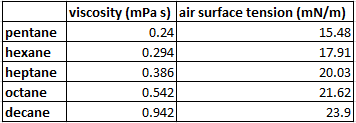Both viscosity and surface tension are dependent on the intermolecular forces between the molecules of the liquid. Supposing from this, shouldn't there be a directly proportional relationship between viscosity and surface tension? i.e. a higher viscosity should mean higher surface tension. But I don't think that this is observed. Honey, while being more viscous then water, doesn't have higher surface tension. (mosquitoes are able to stand on water but slowly sink into honey) Why is this?
2 Answers
Both viscosity and surface tension are connected theoretically to inter-molecular forces, but they are still very different concepts.
Viscosity force is a force that acts only when the fluid is moving and acts to decrease the gradient of velocity in it. Viscosity is a characterization of the fluid itself. Roughly speaking, it says how fast momentum of neighbouring fluid layers propagates perpendicularly to them in a non-equilibrium process.
Surface tension force acts not inside the substance, but only on its boundary with substance of another kind, even if nothing moves. It is not a property of the substance itself, but of a pair of these meeting at the boundary. Often the expression "surface tension of water" is used; but what is meant is surface tension of the pair water-air. Combinations water-glass or water-oil have different value of surface tension. Roughly speaking, surface tension says how much energy of interaction is stored when two chemical species are in mutual contact, even in equilibrium.
-
$\begingroup$ But what would then be the driving force for surface tension? For viscosity, it is obvious that its the drag that molecules face due to each other. If surface tension is a property of a pair of fluids, exactly why does it happen? $\endgroup$ Commented Nov 26, 2014 at 13:52
-
$\begingroup$ Is there a minimum of physical properties from which it could be calculated to at least some degree of accuracy? $\endgroup$– Mark CCommented Jul 25, 2023 at 20:28
-
$\begingroup$ @MarkC I think one can estimate surface tension from latent heat of evaporation and density of liquid, but it's not very accurate. $\endgroup$ Commented Jul 25, 2023 at 22:00
As @JánLalinský nicely explains, surface tension is measured between two fluids, while viscosity is measured within one. Say that you have a droplet of some liquid this means that if you change the surrounding medium the liquid-surrounding surface tension changes, while the viscosity of the droplet will not.
That said, if you keep the surrounding medium constant and very different from the liquids you're looking at then there is indeed a correlation between surface tension and viscosity. Take a look at the table of alkanes below. You can clearly see that with increasing carbon chain length both viscosity and surface tension with air rise.

The problem is that this relation is not generally valid and only holds for relatively simple systems like alkanes with air. If you would for example measure the surface tension of these chemicals with heptane, then obviously this table will have a minimum ($0 \text{ mN/m}$) at heptane, but higher values of surface tension for both hexane and octane.
